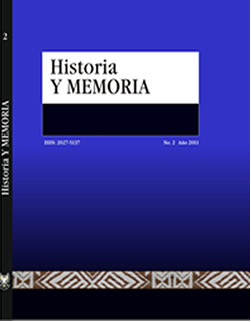The real and the imagery in the building of the first stage of the republic of Colombia

Abstract
The present article a relection about how the history has been a improvement means of the elites in the Colombian society, in spite of the various processes of historic knowledge, this scenery is still alive. It seemed that the historians were not concerned for the incident that it has the knowledge in the conformation of an ideology of nation. This way they have centered the visions on the bicentenary that where there was not a deep relection to itself, but elements have tried to be contributed to disguise the social reality. In this vision is very important to analyze how the symbolic is used to reinforce the relationships of power. Thus, concepts like that of sovereignty that met materialized in the constitutions were focused on a small group that was fulilling certain requirements, which was stopping to a great number of excluded population, generating strong conlicts among the regional and local elites. The relections raised in this article are focused on analyzing how the population and particularly the popular sectors took part in the armies and in this way they have become active part in the construction of nation processes.Keywords
Popular areas, nation, independence, bicentennial, power relations.
Author Biography
Justo Cuño Bonito
Doctor en Historia de América por la Universidad Pablo de Olavide, Licenciatura en Filosofía y Letras (Geografía e Historia) Universidad de Alcalá de Henares, Madrid. Coordinador del programa Doctorado en Historia de América “Mundos Indígenas” Universidad Pablo de Olavide-España.
References
- Archivo General de Indias (AGI), Cuba, 707
- Archivo General de Indias (AGI), Cuba, 889ª
- Archivo General de Indias (AGI), Santa Fe, 747
- Archivo General de la Nación (AGN), Fondo José Manuel Restrepo, Caja 5, Fondo.
- Archivo Regional de Boyacá (ARB), Fondo Notarías.
- Burke, Peter. Formas de hacer Historia. España: Alianza, 2003
- Déloye, Yves. Sociología Histórica de lo político. Santiago: LOM Ediciones, 2004.
- Gramsci, Antonio. La Política y el Estado Moderno. México: Premiá,1978.
- Hobsbawn, Eric. Revolución y Democracia en Gramsci, Fontamara, 1981
- Lèvêque, Pierre. El Mundo Helenístico. Barcelona: Paidós, 2005.
- Luckacs, George. Historia y Consciencia de Clase. Madrid: Sarpe,
- Montalvo, Francisco. “En Los últimos Virreyes de Nueva Granada: Relación de Mando del Virrey Don Francisco Montalvo y Noticias del Virrey Sámano sobre la pérdida del Reino (1803-1819)”.
- Editorial América, Madrid, 1916. Revista Historia de la Educación Latinoamericana: Vol. 14. 2010, UPTC; pp. 298-300.
- Pombo, Lino. Reminiscencias del Sitio de Cartagena, 1862.
- Pombo, Manuel Antonio, y Guerra, Joaquín. Constituciones de Colombia, Tomo II. Bogotá: Banco Popular, 1986.
- Tocqueville, Alexis De. El Antiguo Régimen y la Revolución. Madrid: Guadarrama, 1969.
- Thompson, E.P. Tradición, Revuelta y Conciencia de Clase. Estudios sobre la crisis de la sociedad preindustrial. Crítica, 1984.
Downloads
Download data is not yet available.